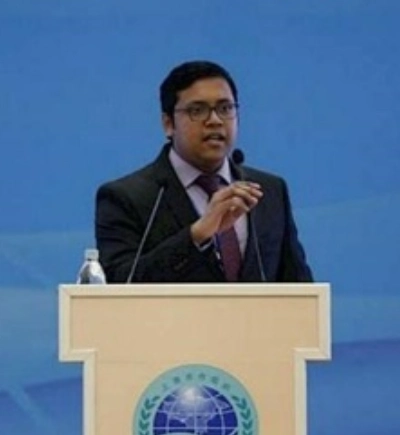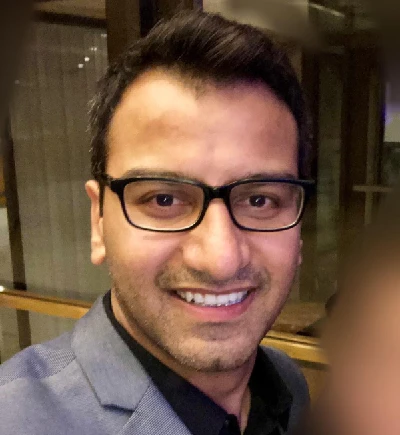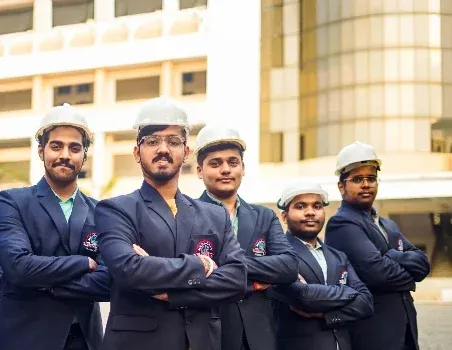PROGRAMS
B.Tech. - Computer Science and Engineering
-
Faculty Engineering
-
Department Computer Science and Engineering
-
Duration 8 Semesters (4 Years)
Eligibility Criteria
12th Passed with: Physics + Mathematics + (TOS) Third Optional Subject (TOS) in 12th : Chemistry / Computer Science / Electronics/ Information Technology / Biology / Informatics Practices / Biotechnology/ Technical Vocational subject/ Agriculture/ Engineering Graphics/ Business Studies/ Entrepreneurship
Program Overview
B.Tech in Computer Science and Engineering is a four-year undergraduate program that equips students with a strong foundation in the principles and practices of computer science and engineering.
The program prepares students to ideate and solve advanced computational challenges. Students gain an in-depth understanding of fundamental topics such as programming, data structures, computer networks, and database management systems. They also study advanced areas such as distributed systems, artificial intelligence, machine learning, and cybersecurity. By blending theoretical knowledge with practical applications, the program helps students hone their critical thinking, and problem-solving skills.
Graduates of B.Tech CSE program from one of the best universities for computer science engineering can pursue various professions such as software developers, database administrators, data scientists, IT consultants or network engineers.
Course Curriculum
Programme Educational Objectives (PEOs)
The Program Educational objectives of the Computer Science and Engineering undergraduate program are to:
PEO-1
Provide strong theoretical foundations to work with cutting edge computing technologies and design solutions to complex engineering problems to work in any competitive environments.
PEO-2
Impart skills such as team building, interpersonal skills, and leadership qualities in order to effectively communicate with the engineering community and with society at large.
PEO-3
Promote research culture through internships, industry training, research-oriented projects, sponsored collaborative research and enable them to pursue higher studies in computer and related fields.
PEO-4
Create ethically strong, professionally and globally competent employees and entrepreneurs.
Programme Outcomes (POs)
Engineering graduates will be able to:
POs-1
Engineering knowledge:
Apply the knowledge of mathematics, science, engineering, fundamentals, and an engineering specialization to the solution of complex engineering problems.
POs-2
Problem analysis:
Identify, formulate, review, research literature, and analyze complex engineering problems reaching substantiated conclusions using first principles of mathematics, natural sciences, and engineering sciences.
POs-3
Design / development of solutions:
Design solutions for complex engineering problems and design system components or processes that meet the specified needs with appropriate consideration for the public health and safety, and the cultural, societal, and environmental considerations.
POs-4
Conduct investigations of complex problems:
Use research-based knowledge and research methods including design of experiments, analysis and interpretation of data, and synthesis of the information to provide valid conclusions.
POs-5
Modern tool usage:
Create, select, and apply appropriate techniques, resources, and modern engineering and IT tools including prediction and modeling to complex engineering activities with an understanding of the limitations.
POs-6
The engineer and society:
Apply reasoning informed by the contextual knowledge to assess societal, health, safety, legal and cultural issues and the consequent responsibilities relevant to the professional engineering practice.
POs-7
Environment and sustainability:
Understand the impact of the professional engineering solutions in societal and environmental contexts, and demonstrate the knowledge of, and need for sustainable development.
POs-8
Ethics:
Apply ethical principles and commit to professional ethics and responsibilities and norms of the engineering practice.
POs-9
Individual and team work:
Function effectively as an individual, and as a member or leader in diverse teams, and in multidisciplinary settings.
POs-10
Communication:
Communicate effectively on complex engineering activities with the engineering community and with society at large, such as, being able to comprehend and write effective reports and design documentation, make effective presentations, and give and receive clear instructions.
POs-11
Project management and finance:
Demonstrate knowledge and understanding of the engineering and management principles and apply these to one’s own work, as a member and leader in a team, to manage projects and in multidisciplinary environments.
POs-12
Life-long learning:
Recognize the need for, and have the preparation and ability to engage in independent and life-long learning in the broadest context of technological change.
Programme Specific Outcomes
The Program Specific Outcomes of the Computer Science and Engineering undergraduate program are:
PSO-1
Ability to understand the principles and working of computer systems and a good knowledge about the hardware and software aspects of computer systems.
PSO-2
Ability to work in multidisciplinary teams in small- and large-scale projects by utilizing modern software engineering tools and emerging technologies.
PSO-3
Ability to design and develop computer programs and understand the structure and development methodologies of software systems.
PSO-4
Ability to apply their skills in the field of the specialization AI, Data Science, Web Technology, Networking and Cloud Computing web design, cloud computing and data analytics.
Career Path

Alumni
Admissions
Faq's
Core subjects include Data Structures, Algorithms, Operating Systems, Database Management, Computer Networks, Software Engineering, and Machine Learning.
Graduates can work as Software Developers, System Analysts, Data Scientists, AI Engineers, and IT Consultants in various industries such as IT, finance, and education.
Yes, internships are a crucial part of the curriculum, with opportunities provided through the university's industry tie-ups and placement cell.
Yes, the curriculum starts from the basics and progresses to advanced topics, making it accessible to students without prior experience in coding.
Admission is based on performance in national entrance exams such as JEE Mains, followed by a university-level counselling process.
Start your journey with Medicap
Contact

Phone
+ 917313111500




.webp)






















